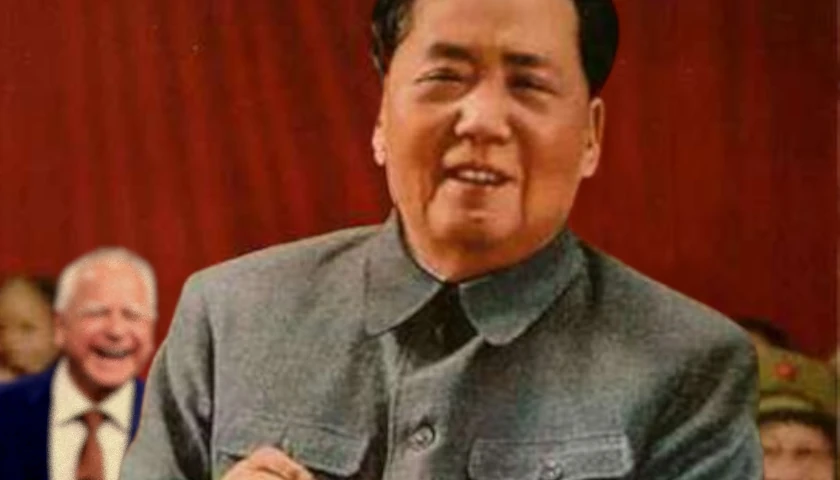by Stephen B. Young
According to one of his students, during their 1995 trip to China, vice presidential candidate Tim Walz sought out copies of Chairman Mao Zedong’s Little Red Book to give to American friends.
Anyone who, in 1995 — two decades after the Great Helmsman’s death and the truth about his unconscionable tyranny over the Chinese people had become widely known — wanted to pass on copies of the Little Red Book is not intellectually fit to execute the office of vice president under the Constitution of the United States.
For those who did not live through Mao’s Cultural Revolution or who don’t remember his Little Red Book, let me fill you in.
I have a first edition of the Little Red Book from 1966 with Lin Biao’s introduction, purchased in Hong Kong. The book contains quotations from Chairman Mao’s many writings. The small book of 311 pages, each 3X5 inches, had a plastic red cover. Millions were printed and handed out. The purpose of the book was to indoctrinate all Chinese with correct Maoist thinking, to make them “Red,” as the saying was, in mind, heart, and spirit, dependent on the Chairman and his Chinese Communist Party as their thought leader.

As Lin Biao wrote in his introduction to the Little Red Book (before he turned against Mao and died when his airplane was shot out of the sky as he was trying to escape to Russia): “The most fundamental task … is at all times to hold high the great red banner of Mao Zedong thought and to arm the minds of the people throughout the country with it.”
A Chinese student of mine in the early 1980s described how the Little Red Book was used by the Red Guards during the Cultural Revolution. Liu Pei had been sent from Beijing to work as a field hand in a rural cooperative to learn how to be a model “Red” Chinese. A Red Guard would come up to him and verbally pounce with a number, say “36” or “114.” Liu Pei was expected to recite every word of the Chairman printed on that page.
If one word was forgotten or mispronounced, it was taken as evidence of not being sufficiently “Red” and patriotic. Therefore, discipline was administered and more right-thinking education imposed to help him self-correct and eradicate the non-proletarian tendencies of his personality.
The author of the book, by the way, is credited with causing the deaths of at least 30 million Chinese, which puts Mao way ahead of Adolph Hitler as a killer of people.
So, we might consider the Little Red Book as the Chinese counterpart to a mini Mein Kampf setting out the thinking of the leader — Fuhrer in German and Lingxiu in Chinese.
With this parallel to Hitler in mind, we might say that the key sentence in the Little Red Book is this: “Every Communist must grasp the truth, ‘Political power grows out of the barrel of a gun.’”
Thus, the Little Red Book instructs us to impose our will, our ideology, on others through force, never taking “Let’s talk about it” for an answer.
Did Tim Walz really think we needed this in America back in 1995? Is this the socialism that Walz thinks of as just friendly and nice “neighborliness?”
The Little Red Book says too, “The seizure of power by armed force, the settlement of the issue by war, is the central task and the highest form of revolution.”
The Little Red Book was also famous on the American Left for passing on Mao’s dictum that “a revolution is not a dinner party.”
Other dicta of the Chairman quoted in the Little Red Book include:
The people, and the people alone, are the motive force in the making of world history.
(I wonder if Walz had this in mind when he spoke of the 2020 riots in Minneapolis as pardonable given past wrongs done to African Americans.)
“The masses have a potentially inexhaustible enthusiasm for socialism. … those who are utterly incapable of seeing this enthusiasm are blind and all is dark ahead of them.”
“In a class society, everyone lives as a member of a particular class, and every kind of thinking, without exception, is stamped with the brand of a class.”
“Our present task is to strengthen the people’s state apparatus — mainly the people’s army, the people’s police, and the people’s courts — in order to consolidate national defense and protect the people’s interests.”
“The people’s democratic dictatorship is based on the alliance of the working class, the peasantry, and the urban petty bourgeoisie.”
“We must conscientiously get rid of every unhealthy manifestation in any link in our work that is detrimental to the unity between the Party and the people.”
“The Revolutionary War is a war of the masses; it can be waged only by mobilizing the masses.”
“Revolutionary culture is a powerful revolutionary weapon for the broad masses of the people. It prepares the ground ideologically before the revolution comes and is an important, indeed essential, fighting front in the general revolutionary front during the revolution.”
How could any of these dicta have been inspiring or relevant to Americans in 1995 (or to the Chinese for that matter)?
And in 2024, they don’t feel like the politics of Joy either.
– – –
Stephen B. Young is the author of Kissinger’s Betrayal: How America Lost the Vietnam War.
Image “Mao Zedong” CCP by and “Tim Walz” by Gage Skidmore CC2.0.





